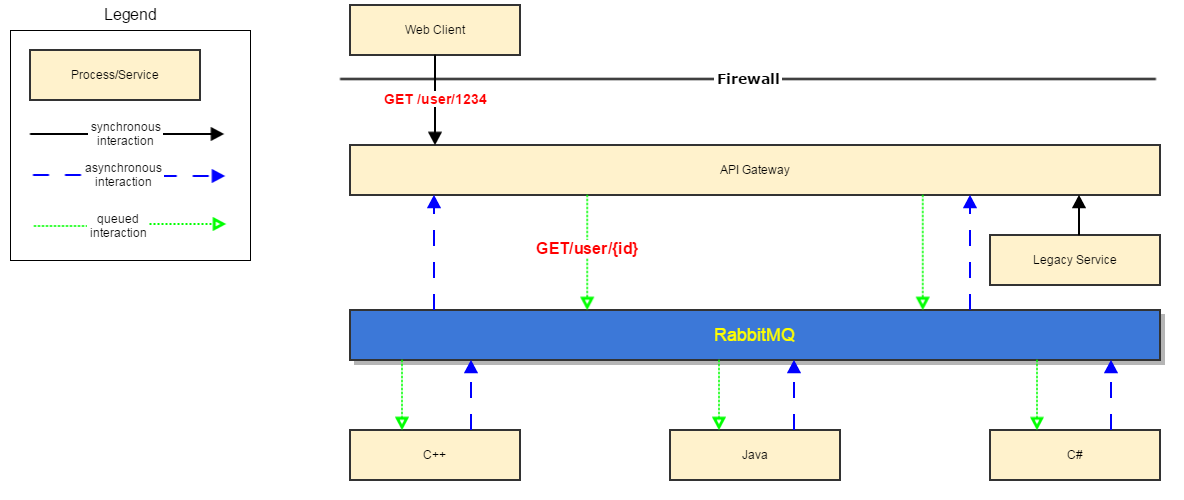Fronting RabbitMQ Services with REST
- speed
- to support multiple programming languages
- a platform for legacy services
- to support a large number of services
- to support mixed payload formats
- to support mixed protocols
- to provide fault isolation
- to support logging and usage reports
ETrade Needed
ETrade Solution

- realized REST can be applied to non-HTTP protocols
- most services are AMQP-based for performance and fault tolerance reasons
- legacy services still used request-response
- bridge the two worlds
Their "aha" Moment
- introduced an API gateway
- implemented in node.js and Express
- wanted non-blocking I/O
- easily could have been Ratpack or vert.x
- provides protocol conversion
- provides payload conversion
- provides service routing
- aggregates parallel service calls
- avoids boilerplate code
- good at REST, leaves business logic to the services
API Gateway
- REST uses URIs to route to services
- AMQP uses exchanges and routing keys to route to services
- gateway maps URIs to routing keys
- GET /account/1234 becomes the key GET/account/{id}
- the mapping is simple and easily understood
- all messages get sent to the same exchange and RabbitMQ handles the routing via the key
- RFC 6570 URI templates easily supported
Routing Technique
- HTTP headers have to be transformed into AMQP headers
- some headers are common but most are protocol specific
- AMQP has a "bucket" in its message structure for custom key-value pairs so HTTP headers can be preserved there
- gateway sets up a one-time listener for the response from the service
- response from the service is returned back to the caller
- newer streaming HTTP preferred but not always possible in older clients
Protocol Translation
- dead letter exchanges used to deal with messages that get rejected, exceed their TTL or when queue lengths are exceeded
- alternate exchanges used to deal with messages that cannot be routed
- not mentioned directly but the gateway must have timeouts in place to avoid waiting for a reply forever
- unclear how partial failures are dealt with -- only 4 of 5 aggregated services responded
Handling Failures
- REST clients preferred JSON
- AMQP services preferred XML
- Gateway handles the transformations between the two
- URI variables get transformed into tags in the XML
- caching possible if etag and if-matches constructs are used in the HTTP requests
- should be possible to use content-type meta-data to transform between different versions of payloads
Payload Transformation
- a service implementation and its exposed API is cleanly separated
- REST endpoints are easier for QA to test against
- gateway can emit reportable events to track API usage and failures
- using Level 2 of the Richardson model (no hyper-media)
- can virtualize services for different types of testing (replace a real service with a fake one, for example)
- can use Ratpack or Vert.x for a JVM solution
Observations
- Ratpack supports the Reactive APIs to simplify serializing the callbacks
- Java 8 Streams might be another option
- LMAX Distruptor might be another alternative
- If possible, use web client APIs that don't block waiting for an answer, such as web sockets
- having all services publish to a single exchange simplifies event producer code
- having exchange keys mimic REST URI is a "bleed through" of a protocol
Observations
- gateway needs to return HTTP status code in addition to failures
- does this imply that service payloads also provide HTTP status codes?
- again, might be more "bleed through"
- gateway provides a nice delineation between public APIs and "behind the firewall" private service APIs.
- to work with the gateway, services will have to conform on a set of exchange patterns -- which is probably a good thing
- allows for efficient binary payloads behind the firewall
Observations
- unclear if a single gateway or multiple gateways exist
- a single gateway might become unweildy